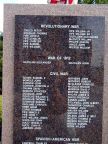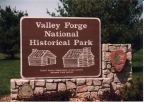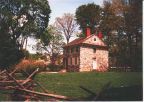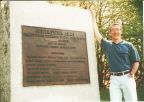Photo Page 3
Fife Family Genealogy
Click Photo To Enlarge
- - Then Click Browser "Back"

Bethel Park, PA. Municipal
Center Historical Memorial
Bethel Park is located in Pittsburgh's
south hills. The town's municipal center is a short distance
from the Bethel Presbyterian Church. To the credit of the local
citizens, an impressive grouping of historical markers has been
installed to honor local residents who have served the country
in various conflicts.
The pictured inscription includes the names of seven Fife men
among the area's fourteen who had military service during America's
war for independence. In the section Fife
Men In The Revolutionary War, research confirms the military
service of four of these men: John Fife, "The Pioneer"
(1721-1800) and two of his sons, William Fife (1751-1808), and
John Fife (1756-1814). The fourth man for whom service has been
verified by the DAR Patriot Index is William Fife (1757-1838),
son of William Senior.
During the war for independence, able-bodied men between the
ages of eighteen and sixty joined local militia units formed
to protect their homes from the ever-present danger of Indian
raids. Few men volunteered to go east to fight the British because
their families would be left undefended. William Fife (1751-1808),
young and single, enlisted at Fort Pitt as a private in the 12th
Virginia Regiment, Virginia Continental Line. His unit marched
east to join other troops in eastern Virginia. In April 1777,
these troops were marched north to Morristown, NJ. Washington's
forces had dwindled to the minimum required to be called an "army".
He knew that the Spring was a time to build his strength, and
the Morristown position could be easily defended. Private Fife's
unit was engaged in raids of the Amboys and New Brunswick. In
July, Washington ordered his forces south where the Continental
Army was maneuvered to protect Philadelphia. Again, William Fife's
unit was engaged in heavy fighting and their defeat at the Brandywine.
In earlly October, the Continentals pushed the British back through
Germantown, a battle considered a draw. The British occupied
Philadelphia where they remained for the winter.
On December 19, 1777, when Washington's poorly fed, ill-equipped
army, weary from long marches, struggled into Valley
Forge, snowy winds blew as the 12,000 Continentals began
the preparations for the winter's encampment.
The Valley Forge landscape was well suited to defensive positions,
with plenty of open field and high ground. The soldiers performed
their duties in the face of incredible hardships. Many displayed
a special character that amazed their own officers as they struggled
with short rations, inadequate clothing, late pay, sickness and
the winter weather. By January, most of the soldiers were sheltered
in huts. Mid-February brought the worst weather of the encampment,
and with it the worst food crisis. Snow and mud blocked roads,
delaying the shipments of much needed supplies. In addition to
maintaining fortifications for defense, the troops went through
intensive training that contributed to a much needed transformation
of the army.
The Virginia State Library in Richmond has written concerning
payroll records: "William Fife is listed as a Private in
Captain Andrew Waggoner's Company, 12th Virginia Regiment on
payrolls for the period from March 1777 through April 1778. The
only period he was not with his company was in July 1777, when
the notation 'sick in hospital' appears next to his name. The
entire Virginia Continental Line, including the 12th Virginia
Regiment, was at Valley Forge during the winter of 1777 to 1778."
William Fife's eighteen-month Continental Line enlistment was
up in May 1778. His travels home likely followed a route through
Reading and Carlisle, and westward with stops at Fort Loudon,
Fort Bedford, Fort Ligonier, and finally Fort Pitt. During the
remaining five years of war, he would be a militia volunteer
on the frontier. It was hardly surprising that the militia turned
to William Fife, not only a veteran of the Continental Army but
also a man with extensive militia experience when he was commissioned
on 02/04/1782 as Captain of the 4th Company, 2nd Battalion, Washington
County Militia.
Eric Fife is photographed standing in front of the Valley Forge
marker to Scott's Brigade. It is located along the park's 'Outer
Line Drive' on the southwestern flank on the outer line of defense.
It is the immediate area where William Fife's unit, Captain Andrew
Waggoner's Company, 12th Virginia Regiment, was encamped. The
marker reads as follows:
VALLEY FORGE
DECEMBER 19, 1777 - JUNE 18, 1778
SCOTT'S BRIGADE
BRIG GENERAL CHARLES SCOTT
COMANDING
4th Virginia Infantry
8th Virginia Infantry
12th Virginia Infantry
Virginia Regiment Infantry At Large
Additional Infantry Regiment Penna
Line Raised January 1778 Consolidated
With 11th Virginia Infantry

Entrance To Valley Forge Park
Eighteen Miles NW of Philadelphia

Washington's Headquarters
Valley Forge 1777-1778

Valley Forge Winter Encampment

Valley Forge Monument
To Scott's Brigade